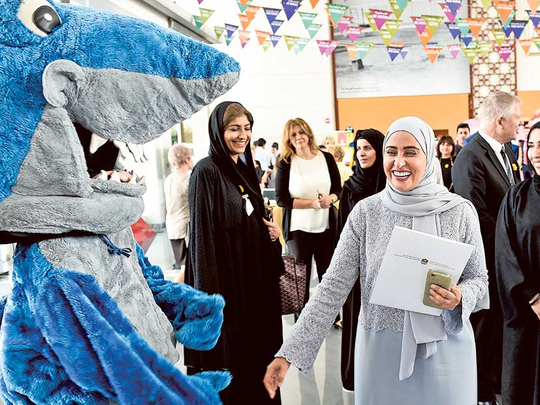
Dubai: Minister of State for Happiness Uhoud Khalfan Al Roumi on Monday announced a new initiative called #100daysofpositivity, which will begin on November 1.
Details will be officially revealed soon, she said, but it is understood schools will launch new projects benefiting students under the initiative, describing it as a “challenge for a happy UAE”.
The announcement came during the What Works conference in Dubai on Monday, organised by the Knowledge and Human Development Authority (KHDA).
Al Roumi invited school leaders at What Works to engage students, parents “and everyone around your school community to train that positivity muscle into action”.
She said: “If we all participate, we could be the catalyst of some important behavioural change in the education system and far beyond that. A nation that produces balanced, happy members of society contributes to the well-being and progress of our planet more than any other efforts combined.
“The children are our future, so let’s work together to teach them how to embrace it with positivity and achieve happiness.”
‘Daily torture’
The remarks followed the minister’s “confession” that, despite being “a straight A student”, she “never felt happy in school”, describing her school routine as “daily torture”. Al Roumi called for “a creative new approach to positive education”. She said “wouldn’t it be inspiring to have happiness and positivity officers in school system too?” just as UAE government entities have been mandated to appoint such officers. The minister also floated the idea of student bodies “including and representing happiness and positivity at school gatherings”.
Additionally, she said, “mindfulness of well-being” of students should be part of school curriculum.
Her comments came against the “happiness” backdrop of this year’s first round of What Works, a KHDA platform for Dubai schools to share best practices and ideas for improvements.
‘Publicly responsible’
Speaking during Monday’s What Works panel discussion on school governance, Abdullah Al Karam, KHDA’s director-general, said Dubai schools will be held accountable on National Agenda education targets.
He said while it was “great and wonderful” for private schools to make profits, this cannot come at the expense of the UAE not being among the world’s “top performing country” in education.
The National Agenda targets for education, which aim to accomplish the goals of UAE Vision 2021, include achieving high global rankings in standardised international assessments (such as TIMSS and PISA); a large percentage of schools with “highly-effective” leadership and “high-quality” teachers; and other indicators.
Al Karam also stressed though private schools have private individuals and interests represented on their governing boards, “you are publicly responsible to provide the education that this country wants”.
A staggering 90 per cent of all education in Dubai takes place in the private sector, which generates around Dh6 billion in annual revenue.
Al Karam revealed that every new school that opened in Dubai since the launch of the National Agenda had to demonstrate its ability and intent to meet the targets. He also told existing schools “you benefited very much from being in this country. It’s time to give back, and there’s no better way than providing the education that this country is setting the ambitions for”.












